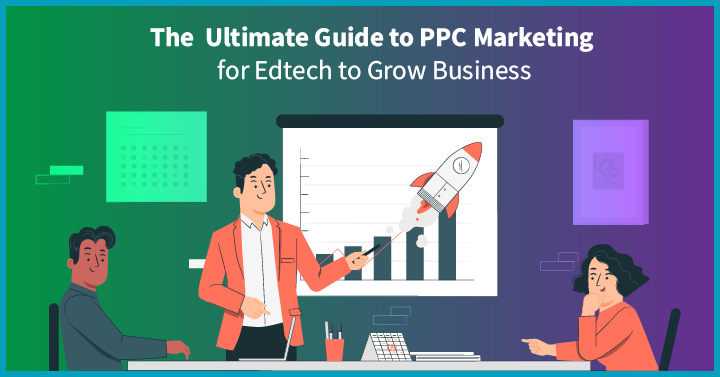According to Acodez, a staggering 79% of marketers agree that PPC is not just a tool but a game-changer for business growth.
In the fast-paced world of Edtech, where the competition is fierce and the audience discerning, PPC emerges as a strategic ally. It allows businesses to reach their target audience with precision, ensuring their educational offerings are showcased to those who need them the most.
Unlike traditional advertising methods, PPC allows you to tailor your campaigns to specific demographics, geographic locations, and even the timing of your outreach. This precision ensures that your message reaches the right audience at the right moment, maximizing the chances of engagement.
This blog aims to demystify the world of PPC for Edtech, offering actionable insights to propel your business forward.
1. What Is PPC Marketing for Edtech?
PPC stands for pay-per-click, and it is a type of digital marketing that allows you to place ads on search engines and other websites. The idea is simple: you create an ad and bid on specific keywords. If someone searches for those keywords or visits a website that displays your ad, they can click on it and be directed to your website. You only pay when someone clicks on your ad, hence the name pay-per-click.
PPC marketing for Edtech is the same as PPC marketing for any other industry. The only difference is that you are targeting people who are interested in education technology. For example, you might bid on keywords like “online learning,” “e-learning,” or “educational software.” When someone searches for those keywords, your ad will appear at the top of the search results, making it more likely that they will click on it and visit your website.
PPC marketing is a powerful tool for edtech businesses because it allows them to target their ideal audience and show ads to people who are actively searching for what their business offers. Edtech firms use PPC to drive traffic, sales, and inquiries from target audiences. PPC marketing for edtech can help you get in front of the right people with a precise level of targeting, which traditional marketing doesn’t allow.
2. Is PPC Marketing Right for Edtech Firms?
PPC marketing is an essential section of digital marketing for edtech that helps you reach your target audience – educators, students, parents, and educational institutions faster. However, PPC campaigns may not be suitable for every company. Some companies may have a lot of competition when it comes to keywords, bidding strategy, and budget. Technology is a common denominator between how digital marketing works and how edtech firms operate. Being technologically advanced, edtech companies can tap into the power of organic/paid advertising to achieve their marketing goals.
3. How Does PPC Marketing for Edtech Work?
Most edtech firms use PPC marketing as it helps them gain visibility in front of the right audience who intend to buy their services. It is a broad category that includes multiple types, primarily – Google Ads and Social Media Ads. You will pay Google or social media platforms to display your ads at the top or bottom of organic search results and across Google’s display network. For example, the screenshot below shows ads referencing the keyword “edtech company in Australia” on Google search results.
When the user clicks on any of the above links, the amount is taken from the daily budget. The CPC is determined by various factors like – search volume, competition, bidding strategy, etc. Google will continue to run the ads till the budget is depleted. The ads are also shown in a variety of ways like – remarketing ads, display ads, search ads, and local ads.
PPC marketing for edtech costs you by the click, is more targeted, and can fetch quality leads. It is estimated that the average cost-per-click (CPC) goes up yearly and could be high for edtech companies.
4. Pros and Cons of PPC Marketing for Edtech
PPC marketing in edtech brings clear benefits like reaching the right audience and being able to quantify results, but it also comes with pitfalls. Understanding both sides helps grasp its power and potential challenges. Let’s go ahead and dive into its pros and cons:
4.1 Pros of PPC Marketing for Edtech
- PPC for edtech gives measurable results
PPC networks provide metrics such as impressions, clicks, and CTR that enable advertisers to see if their ads are converting and giving them the best ROI. You can monitor these KPIs to understand how your ad campaigns are performing and optimise them accordingly for better results.
- PPC for edtech gives instant results
If you want quick results for your edtech campaign, PPC is the best option. You can easily set up a PPC campaign through Google Adwords or equivalent channels and bid on the keywords you believe your target market will use to find information on search engines. You don’t have to wait longer to see the results with PPC.
- PPC for edtech exposes your business globally
If you want to promote your edtech brand globally by targeting the right people, you can invest in PPC. It gives advertisers control over the exposure, making it ideal for local and international reach. You can create copies that speak directly to the selected audience, which means your ads will likely have a higher CTR.
- PPC for edtech enhances brand visibility
It helps businesses reach a broader audience and increase their brand awareness. PPC marketing is important for businesses that are just starting and need to create a name for themselves in the industry. By strategically placing ads on relevant platforms, it provides them with immediate visibility and helps companies establish themselves in the industry.
4.2 Cons of PPC Marketing for Edtech
- PPC for edtech is complex
PPC ads need a lot of attention due to the changing CPC. You need to monitor the performance and optimise your edtech marketing campaign for better search results. There are a lot of variables involved in PPC, and you will lose money if you don’t strategise properly. You may have to spend more time and money to learn how to maximise PPC compared to other digital strategies.
- PPC ads for edtech disappear when the campaign ends
PPC ads stop appearing on search results as soon as you stop paying; eventually, the sales that come with it will stop. If you have a decent edtech advertising budget, it would not be a problem. However, if you want to market your edtech brand with a limited budget, you might not get the desired results with PPC.
- PPC campaigns need a winning edtech marketing strategy
PPC is an effective form of marketing to get started with. However, executing a successful PPC campaign takes time. You need to research the keywords and the right audience and constantly tweak the data based on Google Analytics reports. It may take trial and error to find a winning strategy that works for your edtech brand.
- PPC ads can increase click fraud risks
Click fraud is a deceptive practice where individuals or automated systems generate fraudulent clicks on PPC ads with the intention of depleting the advertiser’s budget without delivering genuine interest or potential customers. This malicious activity can involve competitors, bots, or even unethical publishers seeking to exploit the pay-per-click model.
5. Seven Steps to Start PPC Marketing Campaign for Edtech
Starting a PPC campaign for your edtech business can be a pivotal step in boosting your visibility. Here are seven key steps that will serve as your roadmap to launch an effective PPC campaign.
5.1 Figure Out Your Budget
The first thing you need to understand is how much you want to spend on your edtech marketing campaign. You need to check some industry benchmarks to know how much you will likely pay for a conversion and set up an initial budget.
Once you have determined the budget, you must consider the daily and lifetime spending caps. You can use online tools and even follow Google’s recommendations to estimate how many clicks your budget will likely get. If your budget doesn’t seem to give meaningful results, look for some alternative.
5.2 Set Campaign Goals
Before you plan to implement a PPC marketing campaign for edtech, you need to understand your goals. So, what should the goals of PPC campaigns look like?
For example –
- Gain a 250% increase in website traffic in the next three months
- Increase sales conversion by 50%
- Bring $1 billion in conversions in 12 months
These are some goals you can set up for your PPC campaign for edtech. You can use a combination of platforms and ad types to target relevant audiences. Setting goals will help you target the correct audience and measure the ROI. You can optimise the edtech campaign based on the actions taken by your audience.
5.3 Choose the Type of Campaign
Based on your goals, you can choose the type of campaign. There are many options, each giving you the flexibility to reach your target audience. Some popular types are –
- Search ads – These are shown on the top of SERPs
- Display ads – These types of ads are shown on Google partner or affiliate sites
- Retargeting – These are shown to people who have already engaged with your business
- Instream ads – These are shown on YouTube or played before the video loads
- E-commerce ads – These are shown on Google shopping stores
You need to find out the type of ad based on your goals. For instance, display ads work best for you if your goal is to increase brand awareness. On the other hand, if you want to generate leads, you can create a PPC campaign in Facebook Ad Manager. It is also essential to keep your eye on the ROI so that you can tweak your edtech marketing strategy.
5.4 Audience targeting
Focus on the kind of audience you are targeting and their stage in the sales funnel. The key to achieving success with PPC marketing is not targeting the most relevant keywords but the search intent. There are several types of audiences you can target, such as –
- In-market audience – These are the ones who are actively researching edtech services or products
- Custom audience – These are the ones that are categorised based on keywords and URLs they visit
- Remarketing – These are the people who have already engaged with your business
You can also build your social media audience to target based on your user personas. When it comes to PPC advertising on social media, you can target existing specific leads, lookalike audiences, or target a different group based on interests, demographics, and behaviours.
5.5 Research and Bid on the Keywords
Keywords are one of the important tools you’ll use to reach your target audience. You need to narrow the keywords based on your goals and audience interests. The significant part here is to understand the search intent.
For example, who is more likely to convert – someone searching for “what is edtech” or “best education software“? It’s probably the second one.
The keywords you choose should fit into the buyer’s journey. Remember that the keywords that attract people at an advanced stage of their buyer journey will cost you more. Once you have shortlisted the keywords, you can bid on them. With Google Adwords, you don’t have to worry about bidding, as Google will automatically bid on your behalf. You can set the maximum bid – if you wish to get more clicks.
5.6 Create Unique Landing Pages
Create unique landing pages for each PPC marketing campaign rather than directing visitors to the generic landing or product pages. Using the same landing page for all your PPC campaigns might lower the quality score and even reduce the conversion rate.
The most effective PPC campaign strongly connects audience targeting and landing pages. The most relevant landing page is to fulfil the initial search intent and includes – signups, purchases, downloads etc. Here is an example of a thoughtful landing page for the keyword “Best LMS in Australia“.
The landing page copy of ‘Corner Stone Demand‘ focuses on their value proposition: to bring together growth and learning into a personalised experience.
5.7 Monitor the Performance
As mentioned above, you need to optimise the performance of your ads from time to time. At a basic level, you need to consider the below metrics –
- Conversion Rate – A higher conversion rate indicates that your ad spend is efficiently used. Conversely, a lower conversion rate denotes that your edtech marketing spend is suitable for high-performing keywords.
- Click-Through-Rate (CTR) – It can help you determine how relevant the content is and how well the message is conveyed
- Cost-Per-Click (CPC) – This amount shows how much you are willing to pay to get your audience’s attention.
- Quality Score – This metric for Google Adwords shows the effectiveness of factors such as – landing page relevance, ad relevance, and click-through rate (CTR).
If your goal is to generate leads, you should consider the on-site engagement metrics such as – page views, sessions, bounce rate etc. Keeping track of these metrics helps you evaluate the effectiveness of your edtech advertising campaign. It also lets you understand which targeting strategies and keywords are most valuable for your business.
6. Case Study Examples of PPC Marketing for Edtech
- AB Tutor
AB Tutor is a classroom management software designed to create unique learning opportunities. Their landing page is shown on the top of search results for the keyword “edtech firms in Australia”.
- Tiyara
Tiyara is an edtech firm that provides educational scholarships to underprivileged students. Their PPC advertising strategy improved their brand awareness and established a robust online presence.
7. How Can a Digital Marketing Agency Help?
If you’re new to PPC marketing, then it can be overwhelming to get started. That’s where a digital marketing agency can help. They can help you create a strategic PPC marketing campaign that will help you achieve desired results.
Growth Ganik is a full-stack digital marketing agency that specialises in paid media marketing. We create targeted ads that are designed to attract your target audience. Our team also monitors your campaigns and makes adjustments as needed to ensure that you’re getting the best possible results.
In addition to PPC marketing, our agency can also help you with other digital marketing strategies such as targeted SEO, social media marketing, and content marketing. Reach out to us today for a FREE 45-minute consultation.
8. FAQS
- How Much Do Edtech Companies Spend on Marketing?
According to data on Livemint, edtech firms have reduced their marketing spending, which was 11.6% in 2019 and 8% in 2021.
- Who Are the Customers of Edtech?
Students, parents, teachers, and educational institutions are the target audience of edtech firms.
- How Do I Market for Edtech?
SEO, Social media marketing, content marketing, and email marketing are some of the best ways to market your edtech firm.
- What is the cost of PPC marketing for Edtech?
The cost of PPC marketing for Edtech varies depending on the platform you choose to advertise on and the keywords you target. You can set a budget for your campaign and control your spending.
- How long will it take to see results from a PPC marketing campaign?
You can see results from a PPC marketing campaign almost immediately. However, it’s important to remember that it takes time to optimise your campaign for the best results.
- Can I target a specific audience with PPC marketing?
Yes, you can target a specific audience with PPC marketing. You can target keywords that your audience is searching for and create ads that are designed to attract them.

















